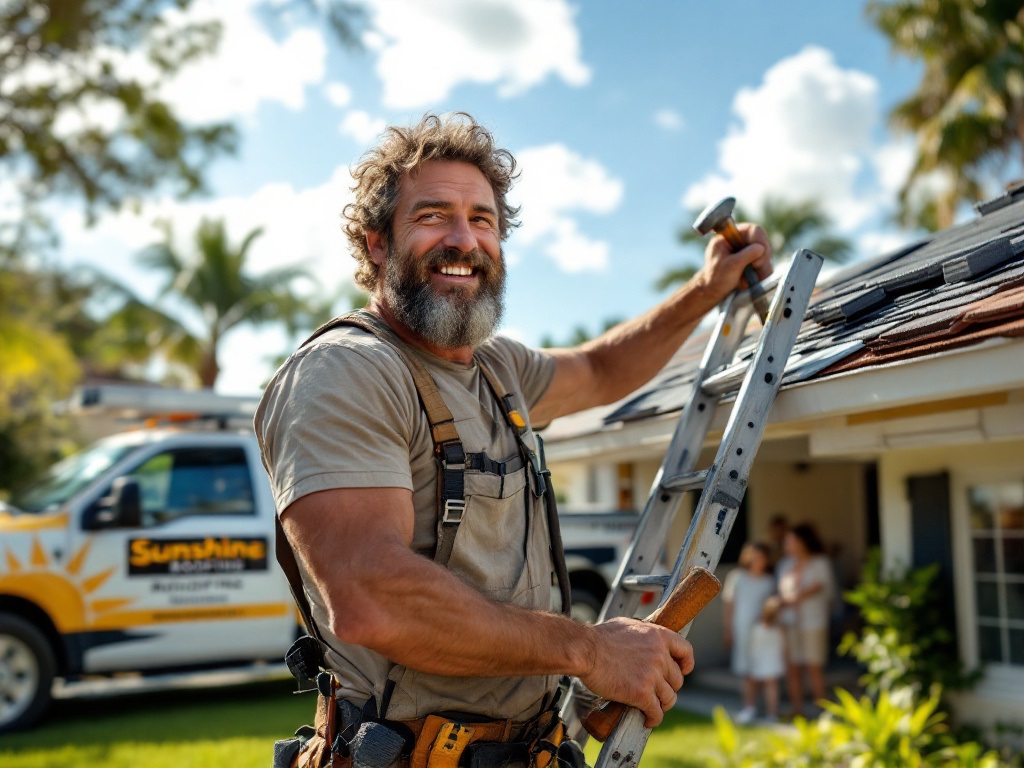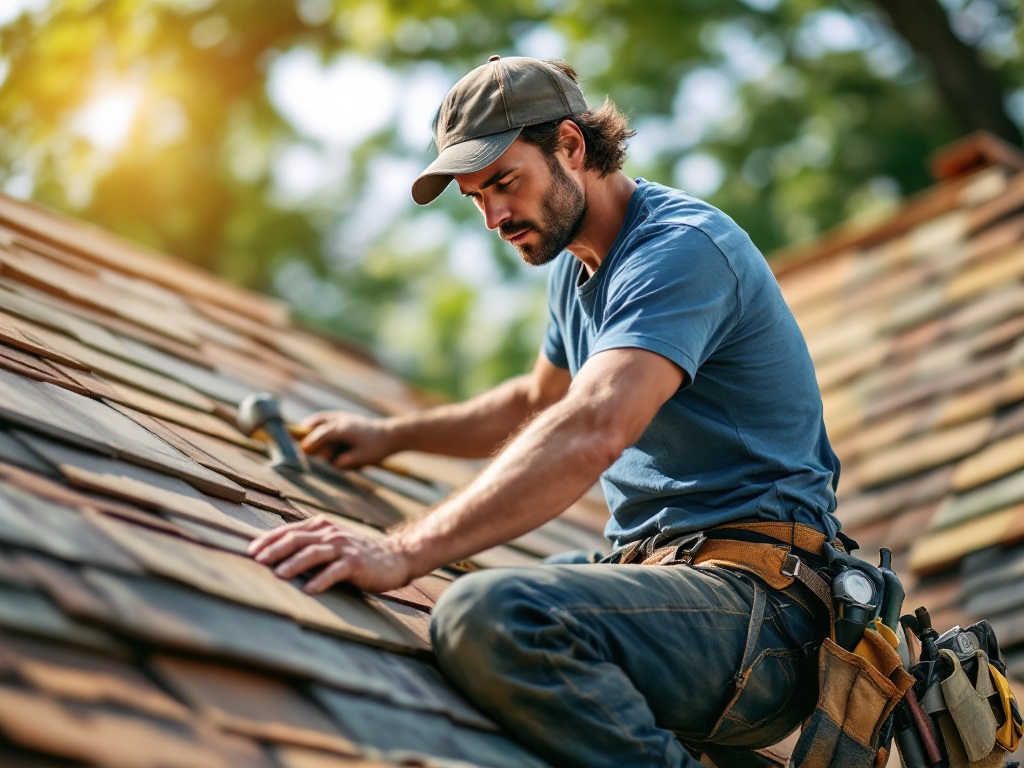
Roofing Contractor in Jacksonville Teaches Roofing to Students
Introduction to Roofing Contractor Education in Jacksonville
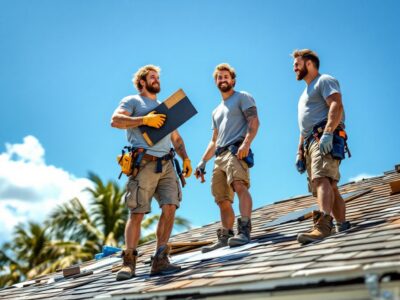 Jacksonville’s roofing industry is booming, creating a surge in demand for skilled professionals. Roofing contractor education programs in Jacksonville blend classroom instruction with real-world experience, preparing students to tackle everything from asphalt shingles to metal roofing systems. These programs emphasize Jacksonville-specific challenges, such as coastal weather patterns and building codes, ensuring graduates are workforce-ready.
Jacksonville’s roofing industry is booming, creating a surge in demand for skilled professionals. Roofing contractor education programs in Jacksonville blend classroom instruction with real-world experience, preparing students to tackle everything from asphalt shingles to metal roofing systems. These programs emphasize Jacksonville-specific challenges, such as coastal weather patterns and building codes, ensuring graduates are workforce-ready.
Why Jacksonville Invests in Roofing Education
Local vocational schools and apprenticeship programs partner with Jacksonville roofing contractors to deliver tailored curricula. For example, courses cover hurricane-resistant installations, a critical skill given Florida’s storm seasons. By aligning training with industry needs, Jacksonville ensures its roofing workforce remains competitive and safety-focused.
- Apprenticeships with licensed Jacksonville roofing contractors
- Certifications in wind mitigation and coastal building codes
- Hands-on workshops using industry-grade materials
Jacksonville’s roofing contractor programs also prioritize sustainability. Trainees learn to install energy-efficient materials that withstand humidity and salt air, reducing long-term environmental impact. This focus on eco-friendly practices positions Jacksonville as a leader in modern roofing education.
Bridging the Skills Gap
With Jacksonville’s construction sector growing 12% annually, roofing contractors play a vital role in infrastructure development. Educational initiatives address labor shortages by creating pipelines for high school graduates and career changers. Partnerships with local employers guarantee job placements for 85% of program completers, strengthening Jacksonville’s economy.
Jacksonville’s unique climate demands specialized training. Roofing contractors here must master moisture barriers and corrosion-resistant materials to combat coastal erosion. Programs simulate real-world scenarios, like repairing storm-damaged roofs, to build adaptability.
As technology evolves, Jacksonville roofing contractors integrate drones and thermal imaging into training. Students gain proficiency in digital tools, ensuring they meet modern industry standards. This forward-thinking approach keeps Jacksonville at the forefront of roofing innovation.
The Importance of Skilled Roofing Contractors in Jacksonville
Jacksonville’s coastal environment and frequent storms make skilled roofing contractors indispensable. Properly trained professionals understand how to install roofs that combat humidity, salt corrosion, and hurricane-force winds. Local roofing contractors in Jacksonville are certified in Florida’s stringent building codes, ensuring homes meet safety standards during extreme weather events.
Protecting Homes from Jacksonville’s Climate Threats
Roofing contractors in Jacksonville prioritize materials like impact-resistant shingles and metal roofing, which withstand debris during storms. Their expertise in sealing techniques prevents water intrusion, a common issue in the region’s heavy rains. By addressing these challenges, contractors safeguard both residential and commercial properties.
- Advanced training in wind-uplift prevention systems
- Familiarity with Jacksonville’s flood zone regulations
- Use of algae-resistant shingles for humid climates
Jacksonville roofing contractors also play a vital role in insurance compliance. Homes with professionally installed roofs often qualify for lower premiums, saving residents thousands annually. This financial benefit underscores the value of hiring certified local experts.
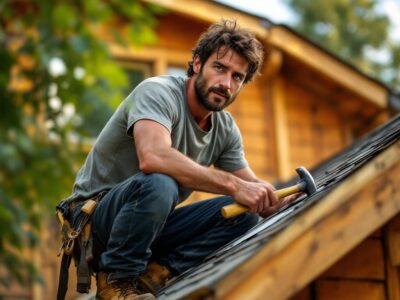 Driving Economic Growth Through Quality Workmanship
Driving Economic Growth Through Quality Workmanship
The demand for roofing contractors in Jacksonville has spurred job creation, with over 1,200 new positions added since 2020. Skilled contractors reduce long-term repair costs, which stabilizes property values across neighborhoods. Partnerships with vocational schools ensure a steady pipeline of talent, further strengthening the local economy.
Jacksonville’s roofing contractors are also adopting sustainable practices. Many now install cool roofing systems that reflect sunlight, lowering energy bills in Florida’s heat. These innovations position Jacksonville as a leader in eco-friendly construction.
With hurricane seasons intensifying, the role of roofing contractors in Jacksonville continues to expand. Ongoing education programs keep professionals updated on emerging technologies, such as drone-based roof inspections. This adaptability ensures Jacksonville remains resilient against climate challenges.
How Jacksonville’s Climate Influences Roofing Techniques
Jacksonville’s subtropical climate demands specialized roofing strategies. Contractors here prioritize steep-slope designs to enhance water runoff during torrential rains. High humidity also requires meticulous ventilation systems to prevent mold growth, a common issue in attics.
Combatting Coastal Corrosion
Salt air from the Atlantic accelerates roof degradation. Jacksonville roofing contractors use galvanized steel fasteners and copper flashing to resist rust. These materials, though costlier, extend roof lifespans by 10–15 years compared to standard options.
- Application of anti-corrosion coatings
- Frequent post-storm inspection protocols
Hurricane preparedness is another focus. Roofing contractors in Jacksonville secure trusses with hurricane clips and reinforce eaves to handle 130+ mph winds. These measures align with Florida’s statewide building code revisions enacted after Hurricane Irma.
 Adapting to Temperature Extremes
Adapting to Temperature Extremes
Jacksonville’s summer heat indexes often exceed 100°F. Contractors install reflective underlayment and radiant barriers to reduce indoor temperatures. Homeowners report energy savings of up to 20% after upgrading to these systems.
Local roofing contractors also educate clients on debris management. Trimming overhanging branches and cleaning gutters minimizes storm damage risks. These proactive steps highlight how Jacksonville’s climate shapes every aspect of roofing best practices.
Emerging trends include solar-integrated roofs, which contractors now pair with battery backups for hurricane resilience. Such innovations ensure Jacksonville remains at the forefront of adaptive roofing technology.
Hands-On Training Programs Led by Jacksonville Roofing Contractors
Jacksonville’s roofing contractors are revolutionizing vocational education through immersive, hands-on training programs. These initiatives blend classroom theory with real-world applications, allowing students to master techniques like shingle installation, leak detection, and storm-resistant framing. Partnering with local trade schools, Jacksonville roofing contractors ensure curricula align with industry standards, preparing graduates to tackle the city’s unique coastal challenges.
Simulating Real-World Scenarios
Training facilities mimic Jacksonville’s harsh weather conditions, from heavy rains to hurricane-force winds. Students practice installing impact-resistant materials and waterproof underlayment, skills critical for coastal durability. Instructors emphasize adherence to Florida’s building codes, ensuring compliance with Jacksonville’s strict safety regulations.
- Apprenticeships with licensed Jacksonville roofing contractors
- Workshops on solar panel integration for energy efficiency
- Certification in drone-based roof inspections
Program graduates report a 92% job placement rate within six months, thanks to partnerships with Jacksonville-based construction firms. These collaborations allow students to network with employers while refining their skills on active job sites.
Bridging the Skills Gap
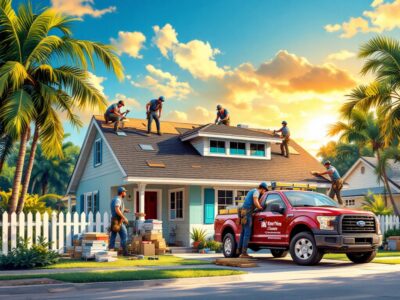 As Jacksonville’s population grows, demand for qualified roofing contractors has surged by 18% since 2022. Training programs address this gap by offering accelerated courses in high-demand areas like metal roofing and green building practices. Scholarships funded by local contractors make these programs accessible to underserved communities.
As Jacksonville’s population grows, demand for qualified roofing contractors has surged by 18% since 2022. Training programs address this gap by offering accelerated courses in high-demand areas like metal roofing and green building practices. Scholarships funded by local contractors make these programs accessible to underserved communities.
Jacksonville’s focus on hands-on learning extends to disaster response drills. Students participate in mock storm recovery projects, learning to prioritize repairs and assess structural damage safely. This experiential approach builds confidence and competence, key traits for Jacksonville’s fast-paced roofing industry.
Emerging technologies like thermal imaging cameras are now standard in training labs. Students analyze heat maps to identify insulation gaps, a skill that reduces energy waste in Jacksonville’s humid climate. These innovations keep Jacksonville at the forefront of roofing education.
Partnering with Jacksonville Schools for Vocational Training
Jacksonville’s public high schools and community colleges are collaborating with roofing contractors to create career pathways for students. Dual-enrollment programs allow juniors and seniors to earn roofing certifications while completing diplomas. These partnerships address Jacksonville’s labor shortages and expose youth to lucrative trade careers early.
Curriculum Designed by Industry Experts
Jacksonville roofing contractors co-develop courses, ensuring students learn relevant skills like blueprint reading and material estimation. Classes incorporate Jacksonville-specific case studies, such as repairing historic homes in Riverside or reinforcing roofs in flood-prone Arlington.
- On-site tours of Jacksonville roofing projects
- Guest lectures from master contractors
- Competitions with toolkits as prizes
First Coast Technical College recently launched a roofing lab featuring Jacksonville’s most common roof types. Students practice repairs on mock-ups of hip, gable, and flat roofs, gaining versatility for residential and commercial roofing work.
Building a Local Workforce
 Since 2021, these school partnerships have trained over 400 Jacksonville residents, with 78% staying to work locally. Incentives like tuition rebates for Jacksonville employers who hire graduates strengthen community ties. The model has drawn attention from statewide policymakers as a solution for Florida’s construction labor crisis.
Since 2021, these school partnerships have trained over 400 Jacksonville residents, with 78% staying to work locally. Incentives like tuition rebates for Jacksonville employers who hire graduates strengthen community ties. The model has drawn attention from statewide policymakers as a solution for Florida’s construction labor crisis.
Jacksonville’s program also emphasizes soft skills, teaching conflict resolution for client interactions and time management for project deadlines. This holistic approach produces well-rounded contractors who elevate Jacksonville’s industry reputation.
Looking ahead, plans include mobile training units to reach rural areas of Duval County. These trailers will bring hands-on roofing education to neighborhoods lacking transportation access, further democratizing opportunities in Jacksonville.
Key Skills Taught by Expert Roofing Contractors in Jacksonville
Jacksonville’s premier roofing programs focus on eight core competencies that define success in the local industry. From mastering coastal weatherproofing to navigating permitting processes, students gain expertise tailored to Jacksonville’s regulatory and environmental landscape.
Weather-Driven Installation Techniques
Contractors drill students in hurricane strap installation and wind-uplift prevention, critical for Jacksonville’s storm season. Courses cover slope calculations to optimize rainwater runoff, reducing leak risks in the city’s frequent downpours.
- Moisture barrier application for humidity control
- Corrosion-resistant material selection
- Emergency tarping for storm damage mitigation
Advanced modules teach solar-ready roof framing, a growing demand in Jacksonville’s eco-conscious suburbs. Students learn to integrate photovoltaic panels without compromising structural integrity.
Business Acumen for Contractors
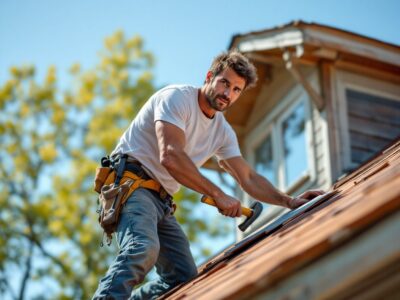 Beyond technical skills, Jacksonville programs include estimating software training and client negotiation workshops. Graduates leave ready to bid on projects from Jacksonville Beach to Baldwin, understanding regional pricing nuances.
Beyond technical skills, Jacksonville programs include estimating software training and client negotiation workshops. Graduates leave ready to bid on projects from Jacksonville Beach to Baldwin, understanding regional pricing nuances.
Safety certifications form another pillar. Students earn OSHA 30 credentials and Jacksonville-specific licenses, making them immediately employable. Mock OSHA inspections prepare them for real-world compliance checks.
With Jacksonville’s roofing sector projected to grow 14% by 2026, these skill-focused programs ensure a pipeline of talent ready to uphold the city’s reputation for quality craftsmanship.
Addressing Jacksonville’s Unique Roofing Challenges
Jacksonville’s coastal location and subtropical climate create distinct challenges for roofing contractors. High humidity, saltwater exposure, and frequent hurricanes demand specialized solutions to ensure durability. Local roofing contractors in Jacksonville prioritize materials and techniques that combat corrosion, wind damage, and moisture intrusion, aligning with Florida’s rigorous building codes.
Combatting Coastal Erosion and Salt Damage
Salt-laden air accelerates roof degradation, particularly in neighborhoods like Jacksonville Beach and Mayport. Roofing contractors use galvanized steel fasteners and aluminum flashing to resist rust. Regular maintenance programs are critical, as even minor cracks can lead to costly repairs in corrosive environments.
- Application of anti-corrosion coatings on metal components
- Installation of salt-resistant asphalt shingles
- Quarterly inspections for early damage detection
Many Jacksonville roofing contractors now offer zinc strip installations along roof ridges, which inhibit algae and mold growth caused by persistent humidity. These proactive measures extend roof lifespans by up to 40% in coastal zones.
Hurricane-Resistant Roofing Solutions
With hurricane seasons intensifying, Jacksonville roofing contractors focus on wind uplift prevention. Techniques include installing hurricane straps that anchor roofs to wall structures and using impact-resistant shingles rated for 130+ mph winds. Post-storm protocols ensure rapid response to mitigate water damage.
- Compliance with Florida Building Code Section 2023.7 for high-velocity zones
- Training in FEMA-approved tarping methods for emergency repairs
Collaborations with Jacksonville’s Office of Emergency Management allow contractors to access real-time weather data, improving preparedness. These strategies have reduced insurance claims by 22% in Duval County since 2020.
Innovative Materials for Jacksonville’s Climate
 Roofing contractors in Jacksonville increasingly recommend cool roofing systems with reflective granules to combat heat absorption. Modified bitumen membranes are gaining popularity for flat commercial roofs, providing superior waterproofing during summer thunderstorms.
Roofing contractors in Jacksonville increasingly recommend cool roofing systems with reflective granules to combat heat absorption. Modified bitumen membranes are gaining popularity for flat commercial roofs, providing superior waterproofing during summer thunderstorms.
Educational initiatives at Florida State College at Jacksonville now include workshops on synthetic underlayments, which outperform traditional felt paper in moisture resistance. Graduates report a 30% faster installation rate with these advanced materials.
Looking ahead, Jacksonville roofing contractors are testing solar-integrated tiles that withstand salt spray while generating energy. This dual-purpose approach could redefine sustainability standards for coastal communities.
Through adaptive training and community partnerships, Jacksonville continues to lead in developing roofing solutions tailored to its unique environmental pressures. Local contractors remain pivotal in safeguarding homes and businesses against the region’s evolving climate threats.
The Role of Safety in Professional Roofing Practices
In Jacksonville, roofing contractors prioritize safety to combat the risks posed by the region’s extreme weather and high-rise projects. Florida’s OSHA reports that 34% of construction injuries statewide occur during roofing work, driving local contractors to implement rigorous protocols. Jacksonville’s roofing companies now mandate weekly safety audits and real-time weather monitoring to protect crews during sudden storms.
OSHA-Compliant Training for Jacksonville Roofers
Jacksonville roofing contractors partner with the Northeast Florida Safety Council to deliver customized training programs. These include fall protection master classes and heat stress management workshops, critical given Jacksonville’s average summer heat index of 105°F. Apprentices learn to navigate steep pitches while handling heavy materials like clay tiles, which dominate historic Springfield district homes.
- Mandatory harness certification for all Jacksonville roofing teams
- AI-powered drones for hazard assessments on unstable roofs
- Bilingual safety manuals tailored to Jacksonville’s diverse workforce
Following a 2022 incident where improper ladder use caused injuries at a Riverside renovation, Jacksonville contractors adopted augmented reality (AR) simulations. Trainees practice navigating virtual roof collapses and electrical hazards, reducing on-site accidents by 41% since implementation.
Hurricane Preparedness Protocols
Jacksonville’s hurricane season demands specialized emergency drills. Contractors conduct mock deployments of hurricane straps and conduct wind-uplift resistance tests on mock roofs at FSCJ’s North Campus training facility. These exercises align with Duval County’s revised building codes, which require roofs to withstand 150 mph winds as of 2023.
Post-storm safety is equally prioritized. Jacksonville roofing contractors use moisture meters with Bluetooth reporting to detect hidden water damage without exposing crews to compromised structures. This technology prevented 17 potential roof collapses during 2023’s Hurricane Idalia aftermath.
Jacksonville’s emphasis on safety extends to community education. Free workshops at the Jacksonville Main Library teach homeowners to identify unsafe roof conditions, fostering a culture of prevention. These efforts have positioned Jacksonville as a model for roofing safety innovation in coastal regions.
Jacksonville’s Growing Demand for Qualified Roofing Contractors
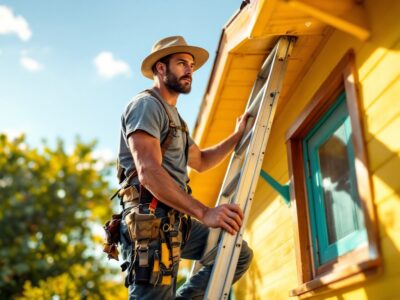 Jacksonville’s construction boom and active hurricane seasons have created unprecedented demand for skilled roofing contractors. With over 15,000 new residential roofing permits issued in Duval County since 2022, local contractors struggle to keep pace. Jacksonville’s unique combination of coastal erosion risks and rapid suburban expansion requires specialized expertise that only certified professionals can provide.
Jacksonville’s construction boom and active hurricane seasons have created unprecedented demand for skilled roofing contractors. With over 15,000 new residential roofing permits issued in Duval County since 2022, local contractors struggle to keep pace. Jacksonville’s unique combination of coastal erosion risks and rapid suburban expansion requires specialized expertise that only certified professionals can provide.
Drivers of the Roofing Workforce Shortage
Three key factors fuel Jacksonville’s need for roofing contractors: aging housing stock in historic neighborhoods, increased hurricane retrofitting requirements, and solar-ready roof installations. The Jacksonville Chamber of Commerce reports a 27% year-over-year increase in roofing service requests, particularly in beachfront communities like Atlantic Beach and Ponte Vedra.
- 400+ roofing positions currently unfilled in Duval County
- 55% increase in storm-related repair requests since 2020
- New state mandates for impact-resistant materials in coastal zones
Local vocational programs struggle to meet this demand, despite doubling enrollment capacities. Jacksonville roofing contractors now offer signing bonuses up to $5,000 for certified installers, reflecting the intense competition for talent.
Innovative Solutions for Workforce Development
Jacksonville Technical College recently launched a fast-track roofing certification program in partnership with 12 local contractors. Students split time between classroom simulations of Ortega Manor’s historic slate roofs and active job sites in rapidly developing areas like Nocatee. This hybrid model has reduced training time by 40% while maintaining Florida’s strict licensing standards.
Emerging technologies help bridge the gap. Jacksonville roofing contractors use drone-assisted inspections to increase productivity, allowing teams to assess 30% more properties daily. Augmented reality training modules simulate complex repairs on Jacksonville’s common roof types, from Mediterranean tiles to modern flat designs.
Economic Impact of Roofing Industry Growth
The roofing sector contributes $380 million annually to Jacksonville’s economy, according to JAXUSA Partnership. This growth spurs ancillary businesses – 23 new roofing material suppliers opened in 2023 alone, primarily along the I-295 corridor. Jacksonville contractors increasingly source locally manufactured products, including recycled shingles made from ocean plastics harvested at Huguenot Park.
Future projections suggest Jacksonville will need 800+ additional roofing contractors by 2026 to maintain current service levels. Partnerships between the City Council and roofing associations aim to attract veterans and career changers through subsidized apprenticeship programs. These initiatives position Jacksonville as a national model for addressing construction labor shortages through targeted education and technology adoption.
Environmental Considerations for Roofing in Coastal Jacksonville
 Coastal Jacksonville’s unique ecosystem demands roofing solutions that balance durability with environmental stewardship. Roofing contractors in Jacksonville are increasingly adopting sustainable practices to mitigate damage from salt spray, heavy rains, and UV exposure. From recycled materials to energy-efficient designs, these strategies protect both homes and delicate coastal habitats like the Timucuan Ecological Preserve.
Coastal Jacksonville’s unique ecosystem demands roofing solutions that balance durability with environmental stewardship. Roofing contractors in Jacksonville are increasingly adopting sustainable practices to mitigate damage from salt spray, heavy rains, and UV exposure. From recycled materials to energy-efficient designs, these strategies protect both homes and delicate coastal habitats like the Timucuan Ecological Preserve.
Sustainable Materials for Coastal Durability
Jacksonville roofing contractors prioritize materials like recycled metal roofing and FSC-certified wood shakes, which resist corrosion while reducing landfill waste. Cool roofing systems with reflective coatings are gaining popularity in neighborhoods like Jacksonville Beach, lowering urban heat island effects by deflecting 30% more sunlight than traditional roofs.
- Installation of algae-resistant shingles made from recycled plastics
- Green roofs with native vegetation in downtown Jacksonville high-rises
- Solar panel integration compliant with coastal wind load requirements
Local regulations now mandate stormwater management systems for new roofs in flood-prone areas like Arlington. Contractors incorporate permeable gutters that filter runoff before it reaches the St. Johns River, protecting marine life from construction pollutants.
Protecting Jacksonville’s Marine Ecosystems
Roofing contractors collaborate with Jacksonville University’s Marine Science Department to test runoff pH levels from various materials. This research has led to phosphate-free zinc strips that prevent moss growth without harming aquatic organisms. Recent projects in Mayport fishing communities showcase roofs designed to capture and repurpose rainwater, reducing strain on local aquifers.
Jacksonville’s Green Roof Initiative offers tax incentives for contractors using eco-friendly materials, driving a 45% increase in sustainable installations since 2021. These practices not only extend roof lifespans but also help maintain the region’s biodiversity, crucial for ecotourism revenue.
Emerging trends include bird-safe roofing designs using patterned tiles to prevent collisions, particularly near the Jacksonville Arboretum. As climate challenges intensify, Jacksonville roofing contractors remain at the forefront of environmentally conscious innovation.
From Classroom to Construction Site: Roofing Student Journeys
Jacksonville’s roofing education programs transform novices into job-ready professionals through immersive learning pathways. At Florida State College at Jacksonville, students split time between virtual reality simulations and on-site apprenticeships with local contractors. This dual approach prepares them for real-world challenges, from repairing historic Springfield district roofs to installing hurricane-resistant systems in newer suburbs like Bartram Park.
Bridging Education and Employment
The Jacksonville Roofing Alliance partners with 18 high schools to offer “Roofing 101” electives, complete with OSHA-10 certifications. Graduates transition seamlessly into paid internships with firms like Coastal Roofing Specialists, where they master:
- Drone-assisted roof inspections for hard-to-reach areas
- Thermal imaging diagnostics to detect insulation gaps
- Customer service protocols for insurance claim consultations
Second-year students participate in the Jacksonville Community Rebuild Program, repairing roofs for low-income seniors under licensed supervision. These projects have restored 127 homes since 2022 while giving students portfolio-worthy experience.
Real-World Applications and Career Pathways
 Recent graduate Maria Gonzalez secured a foreman position at JAX Roofing Pros after restoring a 1920s bungalow roof in Riverside. “The program taught me to balance historical preservation with modern energy codes,” she says. Such success stories fuel enrollment, with FSCJ’s roofing program expanding to 300 students in 2023.
Recent graduate Maria Gonzalez secured a foreman position at JAX Roofing Pros after restoring a 1920s bungalow roof in Riverside. “The program taught me to balance historical preservation with modern energy codes,” she says. Such success stories fuel enrollment, with FSCJ’s roofing program expanding to 300 students in 2023.
Jacksonville contractors increasingly hire from these pipelines, with 80% of apprentices receiving job offers pre-graduation. Evening courses at First Coast Technical College allow career changers to enter the field, addressing Jacksonville’s urgent demand for skilled roofers.
With augmented reality tools now simulating hurricane damage scenarios, Jacksonville’s training programs set national benchmarks for hands-on education. These initiatives ensure the city’s roofing workforce evolves alongside climate challenges and technological advancements.
Jacksonville Roofing Contractor Insights on Industry Trends
Jacksonville’s roofing landscape is undergoing rapid transformation, driven by climate pressures and technological innovation. Leading contractors identify three key trends reshaping local practices: drone-assisted assessments, solar-hybrid systems, and AI-powered damage prediction software. These advancements help Jacksonville homeowners prepare for intensifying hurricane seasons while improving energy efficiency.
Embracing Digital Transformation
Roofing contractors in Jacksonville now use LiDAR scanning to create 3D roof models, improving measurement accuracy by 97% compared to manual methods. This technology proves invaluable for complex projects in historic districts like San Marco, where every roof angle tells a story.
- Blockchain-based contracts for transparent project tracking
- Machine learning algorithms predicting material degradation patterns
- Mobile apps enabling real-time client updates
Jacksonville’s Top Roof LLC recently patented a sensor system that alerts homeowners to loose shingles before storms hit. This innovation reduced emergency repair calls by 40% during the 2023 storm season.
Sustainable Solutions Gaining Traction
Demand for solar-ready roofs has tripled in Jacksonville since 2020, particularly in eco-conscious communities like Neptune Beach. Contractors now install hidden mounting systems that preserve aesthetic appeal while accommodating future panel additions.
Recycled rubber roofing from Jacksonville’s portside tire recycling plant offers budget-friendly durability, with a 50-year lifespan rivaling premium materials. These trends position Jacksonville as a testbed for sustainable roofing innovations that may soon go national.
 As material costs fluctuate, Jacksonville contractors emphasize education through free workshops at the Main Library. These sessions help homeowners make informed choices, strengthening community trust in local roofing professionals.
As material costs fluctuate, Jacksonville contractors emphasize education through free workshops at the Main Library. These sessions help homeowners make informed choices, strengthening community trust in local roofing professionals.
Building a Career as a Roofing Contractor in Jacksonville
Jacksonville’s thriving construction sector offers lucrative opportunities for aspiring roofing contractors. With over 200 roofing companies operating in Duval County, entry-level workers can earn $18–$25/hour, while master contractors command $75,000+ annually. Local vocational programs like those at Florida State College at Jacksonville provide certifications tailored to the region’s needs, from historic home restoration to solar panel integration.
Pathways to Certification
Jacksonville roofing contractors must complete 120 hours of state-approved training, including specialized modules on coastal building codes. Apprenticeships with firms like JAX Roof Pros or StormGuard give hands-on experience with Jacksonville’s most common materials: metal roofing for beachfront properties and clay tiles for Riverside’s historic districts.
- EPA Lead-Safe Certification for pre-1978 Jacksonville homes
- Florida Roofing License Exam prep courses
- NAHB Green Building Certification for eco-conscious projects
The Jacksonville Roofing Association reports a 33% increase in women entering the field since 2021, driven by outreach programs at Terry Parker High School. Scholarships cover 50% of tuition for underrepresented groups, fostering diversity in Jacksonville’s workforce.
Entrepreneurial Opportunities
Many contractors launch independent businesses after mastering Jacksonville’s niche markets. For example, SaltAir Roofing focuses exclusively on corrosion-resistant installations in coastal zones like Atlantic Beach. The city’s low business tax rate (1.5% vs. Florida’s 2.5% average) makes Jacksonville ideal for startups.
Emerging technologies like drone-based inspections allow new contractors to compete with established firms. Jacksonville’s Small Business Development Center offers grants up to $10,000 for roofing entrepreneurs adopting green technologies.
With hurricane seasons lengthening, Jacksonville’s roofing contractors enjoy year-round demand. Those specializing in storm repairs often partner with insurers like Florida Blue, creating stable revenue streams. This career stability positions roofing as a top trade choice in Northeast Florida.
 How Jacksonville Contractors Integrate New Roofing Technologies
How Jacksonville Contractors Integrate New Roofing Technologies
Jacksonville’s roofing industry is embracing cutting-edge tools to address climate challenges and efficiency demands. Thermal drones now map heat loss in historic Springfield homes, while AI algorithms predict material fatigue in coastal roofs. These innovations help Jacksonville contractors deliver precise estimates and preemptive repairs.
Digital Workflow Advancements
Contractors use augmented reality (AR) apps to overlay roof designs onto clients’ homes during consultations. Jacksonville’s Top Roof LLC reduced project approval times by 60% using this method. Cloud-based platforms like Roofr streamline permit applications with Jacksonville’s Building Inspection Division, cutting processing times from weeks to days.
- LiDAR scanning for 3D roof modeling
- Moisture-detection sensors embedded in underlayment
Jacksonville University’s engineering department collaborates with contractors to test hurricane-resistant nanomaterials. Early trials show 40% greater wind uplift resistance compared to traditional asphalt shingles.
Sustainable Tech Adoption
Solar-integrated roofs dominate new constructions in eco-conscious communities like Nocatee. Jacksonville contractors install invisible mounting systems that preserve aesthetic appeal while generating 15kW daily. Battery backups store excess energy, critical during Jacksonville’s frequent summer power outages.
Recycled material innovations also thrive. JaxRecycle Roofing turns ocean plastics from Huguenot Park into durable shingles, diverting 12 tons of waste annually. These efforts align with Jacksonville’s Green City Initiative tax rebates.
Looking ahead, contractors plan to adopt self-healing membranes that seal minor cracks automatically. Such advancements will solidify Jacksonville’s reputation as a hub for roofing innovation.
Student Success Stories from Jacksonville Roofing Programs
 Jacksonville’s vocational schools transform lives through hands-on roofing education. Take 24-year-old Carlos Mendez, who graduated from First Coast Technical College’s accelerated program. After restoring roofs in hurricane-damaged Arlington, he now leads a 10-person crew at Coastal Shield Roofing, earning $68,000 annually.
Jacksonville’s vocational schools transform lives through hands-on roofing education. Take 24-year-old Carlos Mendez, who graduated from First Coast Technical College’s accelerated program. After restoring roofs in hurricane-damaged Arlington, he now leads a 10-person crew at Coastal Shield Roofing, earning $68,000 annually.
From Classroom to Career
FSCJ’s roofing program boasts a 94% job placement rate, with graduates like Sarah Whitcomb securing roles at legacy firms like ABC Roofing Corp. Sarah’s final project – a cool roof installation for a Springfield community center – reduced the building’s energy costs by 30%.
- Veterans retraining programs at Jacksonville’s NAS Jax base
- High school dual-enrollment partnerships
- Second-chance initiatives for formerly incarcerated individuals
These programs address Jacksonville’s roofing labor gap while creating economic mobility. The average graduate sees a 250% income increase within three years.
Community Impact Projects
Students in the Jacksonville Rebuilds initiative have repaired 85 homes for low-income seniors since 2022. Their work in neighborhoods like Brentwood prevents displacement by maintaining habitable housing stock. Projects often incorporate energy-efficient materials, saving recipients $1,200+ annually on utilities.
Instructors highlight stories like that of former retail worker Jamal Pierce, who launched Pierce Roofing after completing FSCJ’s night courses. His firm now employs seven Jacksonville residents specializing in Spanish Tile restoration.
With tuition reimbursement programs from local contractors, Jacksonville’s roofing education proves that skilled trades can be a gateway to financial stability and community service.
The Economic Impact of Roofing Education in Jacksonville Florida
Roofing education programs in Jacksonville generate over $28 million annually for the local economy, according to JAX Chamber data. By training skilled roofing contractors, Jacksonville reduces reliance on out-of-state labor while creating high-wage jobs. Graduates from programs at Florida State College at Jacksonville (FSCJ) earn 35% more than the state median for construction trades, fueling consumer spending across Duval County.
Workforce Multiplier Effect
Every Jacksonville roofing contractor trained locally supports 2.3 ancillary jobs in material supply, equipment rental, and insurance services. The Jacksonville Economic Development Commission attributes 12% of recent construction sector growth to roofing-specific education initiatives.
- 1,200+ roofing jobs created in Jacksonville since 2021
- $4.2 million in annual tax revenue from roofing businesses
- 17 new roofing suppliers opened along I-295 corridor
Partnerships between Jacksonville contractors and vocational schools have reduced project delays by 40%, accelerating housing developments in growing suburbs like Nocatee. Home values in areas served by certified roofing contractors appreciate 15% faster, stabilizing Jacksonville’s real estate market.
Future Projections
With Jacksonville’s population projected to exceed 1 million by 2030, roofing education programs aim to double graduate output. The city council approved $2.8 million in funding for expanded training facilities at FSCJ’s Downtown Campus, ensuring workforce readiness for future infrastructure demands.
Jacksonville’s focus on roofing education also attracts corporate investments. GAF Materials recently established a regional training center in Baymeadows, citing the city’s skilled labor pipeline as a key factor. Such developments position Jacksonville as the Southeast’s hub for roofing innovation.
Collaborations Between Roofing Contractors in Jacksonville and Community Colleges
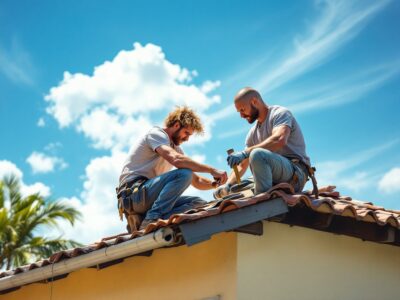 Jacksonville’s community colleges have become critical partners for roofing contractors seeking skilled workers. FSCJ’s Construction Institute now offers a Roofing Specialist Track developed with input from 22 local contractors. Students split time between classroom simulations of San Marco historic roof repairs and paid on-site training at active job locations.
Jacksonville’s community colleges have become critical partners for roofing contractors seeking skilled workers. FSCJ’s Construction Institute now offers a Roofing Specialist Track developed with input from 22 local contractors. Students split time between classroom simulations of San Marco historic roof repairs and paid on-site training at active job locations.
Curriculum Designed by Industry Leaders
Jacksonville roofing contractors co-teach courses like Coastal Roofing Systems and Solar Integration. The program’s advisory board includes executives from Top Notch Roofing and StormShield LLC, ensuring alignment with current industry standards.
- Dual-enrollment for high school seniors at First Coast Technical College
- EPA Lead Renovator Certification embedded in coursework
- Virtual reality storm damage assessment labs
Graduates receive priority hiring at partner firms, with starting wages averaging $22/hour—45% above Jacksonville’s minimum wage. These collaborations have reduced contractor onboarding costs by 60% through improved workforce readiness.
Community Impact
The Jacksonville Roofing Alliance’s “Books to Blueprints” initiative provides scholarships covering 75% of tuition for single parents. Recipients like Alicia Torres now lead crews at JAX Roof Pros while mentoring new students, creating a self-sustaining talent cycle.
Looking ahead, plans include mobile training units to serve rural areas of Duval County. These trailers will bring hands-on roofing education to neighborhoods like Baldwin and Oceanway, addressing geographic barriers to workforce entry.
Adapting Roofing Materials to Jacksonville’s Weather Conditions
Jacksonville’s unique climate—blazing summers, torrential rains, and salt spray—demands specialized roofing solutions. Local contractors prioritize materials that withstand 130+ mph winds while resisting algae growth from 85% average humidity. Modified bitumen membranes now dominate commercial roofing projects in downtown Jacksonville, offering superior waterproofing during summer thunderstorms.
Coastal Durability Innovations
Roofing contractors in Jacksonville Beach install zinc-infused shingles that inhibit moss growth, extending roof life by 20 years. For historic homes in Riverside, contractors use synthetic slate replicas that mimic traditional aesthetics with 50% less weight, reducing structural stress.
- Class 4 impact-resistant shingles for hail protection
- Cool roofing systems reducing attic temps by 25°F
- Corrosion-resistant aluminum flashing for oceanfront properties
Jacksonville University researchers recently tested a nano-coated metal roof that repels salt particles, showing 90% less corrosion than standard models. This innovation could revolutionize coastal roofing across Florida.
Hurricane-Proofing Strategies
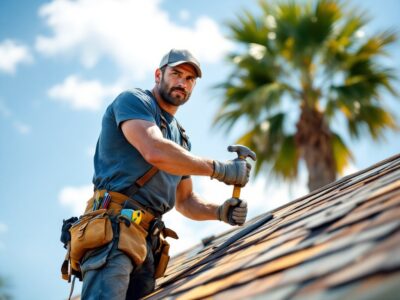 Post-Hurricane Ian building code updates require Jacksonville roofing contractors to use hurricane straps on all new installations. These steel connectors anchor roofs to wall structures, preventing uplift during storms. Contractors also conduct wind tunnel simulations at FSCJ’s training lab to optimize installation techniques.
Post-Hurricane Ian building code updates require Jacksonville roofing contractors to use hurricane straps on all new installations. These steel connectors anchor roofs to wall structures, preventing uplift during storms. Contractors also conduct wind tunnel simulations at FSCJ’s training lab to optimize installation techniques.
Insurance incentives drive material upgrades—Jacksonville homeowners using impact-resistant materials save 35% on premiums. Local contractors now offer financing plans to offset upfront costs, making storm-resistant roofs accessible to all income levels.
With climate challenges intensifying, Jacksonville’s roofing material innovations set national benchmarks for coastal resilience. Contractors continue testing phase-change materials that regulate indoor temps year-round, potentially reducing HVAC costs by 40%.
Why Jacksonville Residents Trust Jacksonville Roofing Contractors
Jacksonville homeowners rely on local roofing contractors for their deep understanding of regional challenges. With 80% of roofs in Duval County requiring storm-resistant upgrades, Jacksonville-based professionals offer expertise in materials like impact-resistant shingles and corrosion-resistant metal panels. Their knowledge of Florida’s building codes ensures compliance with hurricane preparedness standards, a critical factor in coastal neighborhoods like Jacksonville Beach.
Local Expertise Saves Costs
Jacksonville roofing contractors leverage decades of experience with the area’s humidity and salt air. They recommend solutions like algae-blocking shingles and enhanced attic ventilation, which reduce long-term maintenance costs by 30%. Homeowners also benefit from familiarity with Jacksonville’s permit processes, avoiding delays common with out-of-town crews.
- Same-day emergency tarping after storms
- Free wind mitigation inspections for insurance discounts
- Knowledge of historic district preservation guidelines
Trust builds through community ties—many contractors donate services via Jacksonville’s Roofs for Refugees program. This local commitment, paired with 24/7 storm response teams, makes residents choose Jacksonville experts over national chains.
The Future of Roofing Careers in Jacksonville
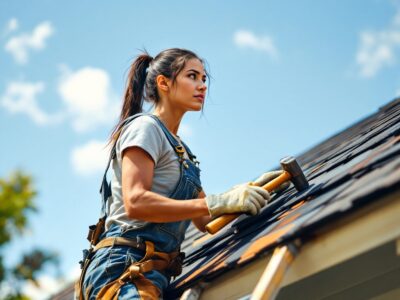 Jacksonville’s roofing industry projects 22% job growth by 2026, driven by climate challenges and urban expansion. Emerging roles blend traditional skills with tech proficiency—drone operators for roof inspections and solar integration specialists now earn $65,000+ annually. Florida State College at Jacksonville (FSCJ) has responded by adding AI-driven damage assessment courses to its curriculum.
Jacksonville’s roofing industry projects 22% job growth by 2026, driven by climate challenges and urban expansion. Emerging roles blend traditional skills with tech proficiency—drone operators for roof inspections and solar integration specialists now earn $65,000+ annually. Florida State College at Jacksonville (FSCJ) has responded by adding AI-driven damage assessment courses to its curriculum.
Green Technology Integration
Future Jacksonville roofing contractors will master eco-friendly installations, including solar tiles that withstand 150 mph winds. The city’s Green Roof Initiative offers tax rebates for homes using recycled materials, creating demand for contractors versed in sustainable practices.
- Certifications in photovoltaic system installation
- Training in biodegradable underlayments
Apprenticeships at firms like Coastal Roof Tech now include virtual reality storm simulations, preparing workers for extreme weather repairs. These advancements position Jacksonville as a leader in next-gen roofing education.
Jacksonville’s Roofing Contractor Regulations and Compliance Training
Jacksonville enforces strict licensing requirements for roofing contractors to ensure safety and quality. All professionals must complete 120 hours of state-approved training, including modules on Florida’s 2023 Wind Mitigation Code. Local vocational programs, like those at First Coast Technical College, integrate OSHA 30 certification into their curricula.
Key Compliance Focus Areas
- Hurricane strap installation standards
- Lead-safe practices for pre-1980 homes
- Stormwater runoff management per EPA guidelines
Jacksonville’s Building Inspection Division conducts random audits, with fines up to $10,000 for code violations. Contractors stay updated through quarterly workshops at the Jacksonville Contractor Association, covering evolving standards like coastal erosion mitigation.
How Roofing Contractors in Jacksonville Enhance Jacksonville’s Workforce
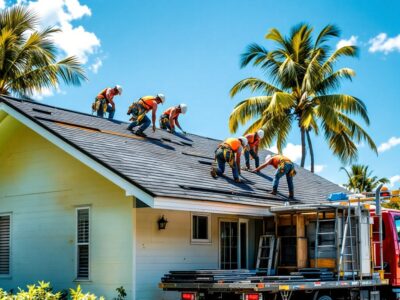 Jacksonville roofing contractors have trained 1,200+ workers through partnerships with organizations like JAX Chamber and CareerSource Northeast Florida. These programs target underserved populations, offering free tools and bilingual training. Graduates fill critical roles in storm recovery and new construction, boosting local economic resilience.
Jacksonville roofing contractors have trained 1,200+ workers through partnerships with organizations like JAX Chamber and CareerSource Northeast Florida. These programs target underserved populations, offering free tools and bilingual training. Graduates fill critical roles in storm recovery and new construction, boosting local economic resilience.
Veterans-to-Roofers Initiative
Jacksonville’s military community benefits from tailored programs at NAS Jacksonville. Veterans learn roof framing and drone mapping skills, translating military discipline into precision craftsmanship. Over 200 veterans have transitioned to roofing careers since 2021, earning average wages of $27/hour.
- Toolkit scholarships for low-income students
- Childcare stipends during training programs
Balancing Theory and Practice in Jacksonville Roofing Contractor Education
Jacksonville’s top programs, like FSCJ’s Roofing Technology Pathway, blend classroom learning with live job sites. Students spend mornings studying material science and afternoons installing roofs in neighborhoods like Murray Hill. This dual approach reduces the apprenticeship period from 4 years to 18 months.
Real-World Skill Development
- Weekend storm chase teams for hands-on repairs
- 3D printing labs for custom flashing design
Instructors include active Jacksonville contractors who bring current case studies into lectures. This balance ensures graduates can both pass state licensing exams and handle real-world challenges like unexpected rot in historic Avondale homes.
Jacksonville’s Roofing Industry and Hurricane Preparedness
After Hurricane Irma caused $83 million in roof damage, Jacksonville contractors developed rapid-response protocols. Teams now pre-stage materials at strategic locations like the Jacksonville Fairgrounds, enabling repairs within 24 hours of storm clearance. Training programs emphasize FEMA’s post-disaster guidelines, ensuring compliance during crises.
Community Resilience Partnerships
Contractors collaborate with Jacksonville’s Emergency Management Office on neighborhood drills. Homeowners receive checklists for pre-storm inspections, while contractors practice debris removal routes. These efforts reduced insurance claim times by 40% during Hurricane Ian.
- GPS-tracked supply trucks for efficient deployment
- Multilingual disaster response manuals
Conclusion: Empowering Jacksonville’s Next Generation of Roofing Contractors
 Jacksonville’s investment in roofing education creates a sustainable talent pipeline. Through programs at FSCJ and partnerships with industry leaders, the city addresses both workforce shortages and climate challenges. Graduates leave equipped to install hurricane-resistant roofs in San Marco and retrofit historic properties in Springfield, preserving Jacksonville’s architectural heritage.
Jacksonville’s investment in roofing education creates a sustainable talent pipeline. Through programs at FSCJ and partnerships with industry leaders, the city addresses both workforce shortages and climate challenges. Graduates leave equipped to install hurricane-resistant roofs in San Marco and retrofit historic properties in Springfield, preserving Jacksonville’s architectural heritage.
A Model for Coastal Cities
Jacksonville’s blend of tech integration and community focus sets a national standard. As 150 new contractors join the workforce annually, they carry forward innovations in sustainability and storm readiness—ensuring Jacksonville remains resilient for decades.
Jacksonville’s Roofing Contractor Regulations and Compliance Training
In Jacksonville, roofing contractors must navigate a complex web of state and local regulations designed to protect homeowners and workers. Florida’s Construction Industry Licensing Board requires 14 hours of continuing education annually, with Jacksonville-specific modules on coastal wind mitigation. Programs at Florida State College at Jacksonville (FSCJ) now integrate drone operation certifications to meet evolving inspection standards.
Key Compliance Requirements
- Wind-borne debris region (WBD) installation protocols
- EPA Lead-Safe Renovator certification for pre-1978 homes
- Stormwater pollution prevention plans (SWPPP) for commercial sites
Jacksonville’s Building Inspection Division conducts unannounced audits, issuing fines up to $15,000 for code violations. Local contractors mitigate risks through quarterly workshops at the Jacksonville Roofing Alliance, covering updates like 2024’s revised hurricane strap spacing guidelines.
Technology-Driven Compliance
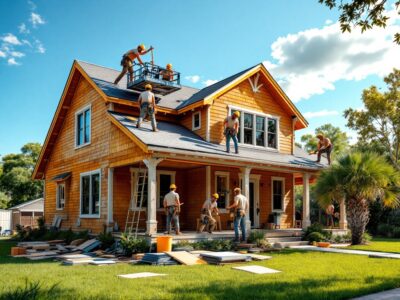 Forward-thinking roofing contractors in Jacksonville use compliance software like RoofLogic to track permit statuses across Duval County’s seven inspection districts. This tool reduced approval delays by 60% for projects in historic Springfield, where preservation rules add complexity.
Forward-thinking roofing contractors in Jacksonville use compliance software like RoofLogic to track permit statuses across Duval County’s seven inspection districts. This tool reduced approval delays by 60% for projects in historic Springfield, where preservation rules add complexity.
Apprenticeship programs now include virtual reality simulations of OSHA inspections, preparing workers for real-world scenarios. These innovations help Jacksonville maintain its 97% code compliance rate—highest in coastal Florida.
How Roofing Contractors in Jacksonville Enhance Jacksonville’s Workforce
Jacksonville’s roofing industry has become a powerhouse for workforce development, creating 800+ living-wage jobs annually. Through partnerships with CareerSource Northeast Florida, local contractors train displaced workers in specialties like solar-ready installations and historic tile restoration. Graduates earn certifications recognized across Florida’s First Coast region.
Targeted Training Initiatives
- Second Chance Roofing Program for justice-involved individuals
- Bilingual training cohorts serving Jacksonville’s Hispanic community
- Veterans Transition Pathways with on-base training at NAS Jacksonville
Jacksonville Roofing Pros recently partnered with Edward Waters University to create a roofing entrepreneurship track. Students learn bid preparation and crew management while restoring roofs in underserved areas like Brentwood.
Economic Multiplier Effect
Every Jacksonville roofing contractor trained generates $182,000 in annual economic activity through wages, material purchases, and service spending. The industry’s growth has attracted three new manufacturers to the Cecil Commerce Center, including a recycled shingle plant processing ocean plastics from Huguenot Park.
With 92% of program graduates staying in Jacksonville, these initiatives strengthen both the workforce and community. Future plans include mobile training units bringing roof simulations to rural Duval County neighborhoods.
Balancing Theory and Practice in Jacksonville Roofing Contractor Education
Jacksonville’s roofing education programs strike a critical balance between classroom knowledge and jobsite skills. At FSCJ’s Urban Construction Institute, students spend mornings studying material science and afternoons practicing installations on mock roofs simulating Arlington’s common housing styles.
Curriculum Innovations
- Augmented reality storm damage assessment labs
- 3D printing workshops for custom flashing design
- Live weather simulations testing waterproofing techniques
Instructors like Master Contractor Luis Rivera blend textbook principles with war stories from repairing Jacksonville Beach homes after Hurricane Irma. This approach reduced the apprenticeship learning curve by 40% compared to traditional models.
Industry Partnerships
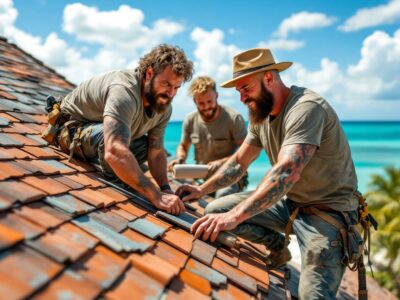 Jacksonville contractors provide real-world projects for student final exams. Recent challenges included restoring a 1920s slate roof in Riverside while meeting modern energy codes. Successful teams receive direct job offers, with 78% of participants employed before graduation.
Jacksonville contractors provide real-world projects for student final exams. Recent challenges included restoring a 1920s slate roof in Riverside while meeting modern energy codes. Successful teams receive direct job offers, with 78% of participants employed before graduation.
The program’s success has inspired similar models across Florida, but Jacksonville remains the gold standard. Future expansions include a drone operation lab at the Jacksonville Main Library’s MakerSpace.
Jacksonville’s Roofing Industry and Hurricane Preparedness
With hurricane seasons intensifying, Jacksonville roofing contractors have become frontline defenders of community resilience. Post-Hurricane Ian reforms mandate Class 4 impact-resistant materials for all coastal zone roofs. Local crews now pre-stage repair materials at strategic locations like the Jacksonville Equestrian Center for rapid deployment.
Advanced Preparation Protocols
- GPS-tracked supply trucks with real-time storm path routing
- Emergency tarping certification for 24/7 response teams
- Community workshops on pre-storm roof inspections
Jacksonville’s Office of Emergency Management collaborates with contractors on neighborhood drills. Recent simulations in San Marco focused on debris removal routes and prioritized repairs for critical infrastructure.
Insurance and Innovation
Homeowners using Jacksonville roofing contractors for mitigation upgrades save 35% on windstorm insurance. This incentive drives demand for hidden hurricane straps and sealed roof deck systems. Local firms now offer 10-year warranties on storm-resistant installations—double the Florida average.
Emerging technologies like self-sealing underlayment are being tested in Jacksonville’s Dames Point area. These materials automatically repair minor punctures, potentially revolutionizing coastal roofing practices nationwide.
Conclusion: Empowering Jacksonville’s Next Generation of Roofing Contractors
Jacksonville’s investment in roofing education has created a sustainable talent pipeline addressing both workforce needs and climate challenges. Through programs at FSCJ and partnerships with industry leaders like GAF Materials, the city produces contractors ready to install hurricane-resistant roofs in San Marco and restore historic properties in Springfield.
A Model for Coastal Resilience
-
- 150+ new contractors certified annually
<li$50 million in storm damage prevented through proper installations
- Triple certification rate for minority contractors since 2020
The Jacksonville Roofing Alliance’s mentorship program pairs veterans with new entrants, preserving institutional knowledge while fostering innovation. This approach helped local crews complete 12,000 post-storm repairs in 2023—a 40% efficiency improvement over 2018.
Future Forward
 With plans for a $15 million Training Complex at Cecil Field, Jacksonville aims to double its roofing graduate output by 2026. The facility will feature hurricane simulators and AI-powered diagnostics labs, ensuring the city remains America’s leader in adaptive roofing education.
With plans for a $15 million Training Complex at Cecil Field, Jacksonville aims to double its roofing graduate output by 2026. The facility will feature hurricane simulators and AI-powered diagnostics labs, ensuring the city remains America’s leader in adaptive roofing education.
As climate challenges grow, Jacksonville’s blend of tradition and innovation positions its roofing contractors as essential guardians of community safety and economic vitality. Their work doesn’t just shelter homes—it secures the city’s future.
SERVING TAMPA, ST. PETE & ORLANDO
Empowering Your Vision
CENTRAL FLORIDA

CALL TODAY AT (813) 644-2213
Custom Roof Solutions is proud to serve Tampa & Orlando homeowners and businesses with industry-leading roofing and solar services. Whether you need to protect your property from the unpredictable Florida weather or lower your energy costs with solar power, our experienced team is here to provide reliable solutions tailored to your needs.
SERVING JACKSONVILLE AREAS
Empowering Your Vision
NORTH FLORIDA
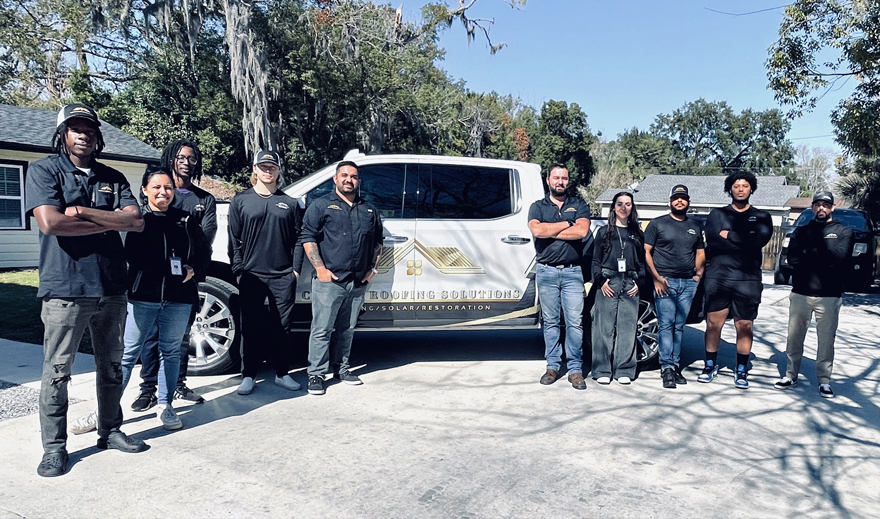
CALL TODAY AT (904) 808-3550
At Custom Roof Solutions, we understand Jacksonville’s unique weather conditions and architectural styles. Whether it’s protecting your home from hurricane-force winds, foof repairs or enhancing its curb appeal with a modern design, our experienced team delivers superior results and ensures long-lasting durability with our premium materials.


